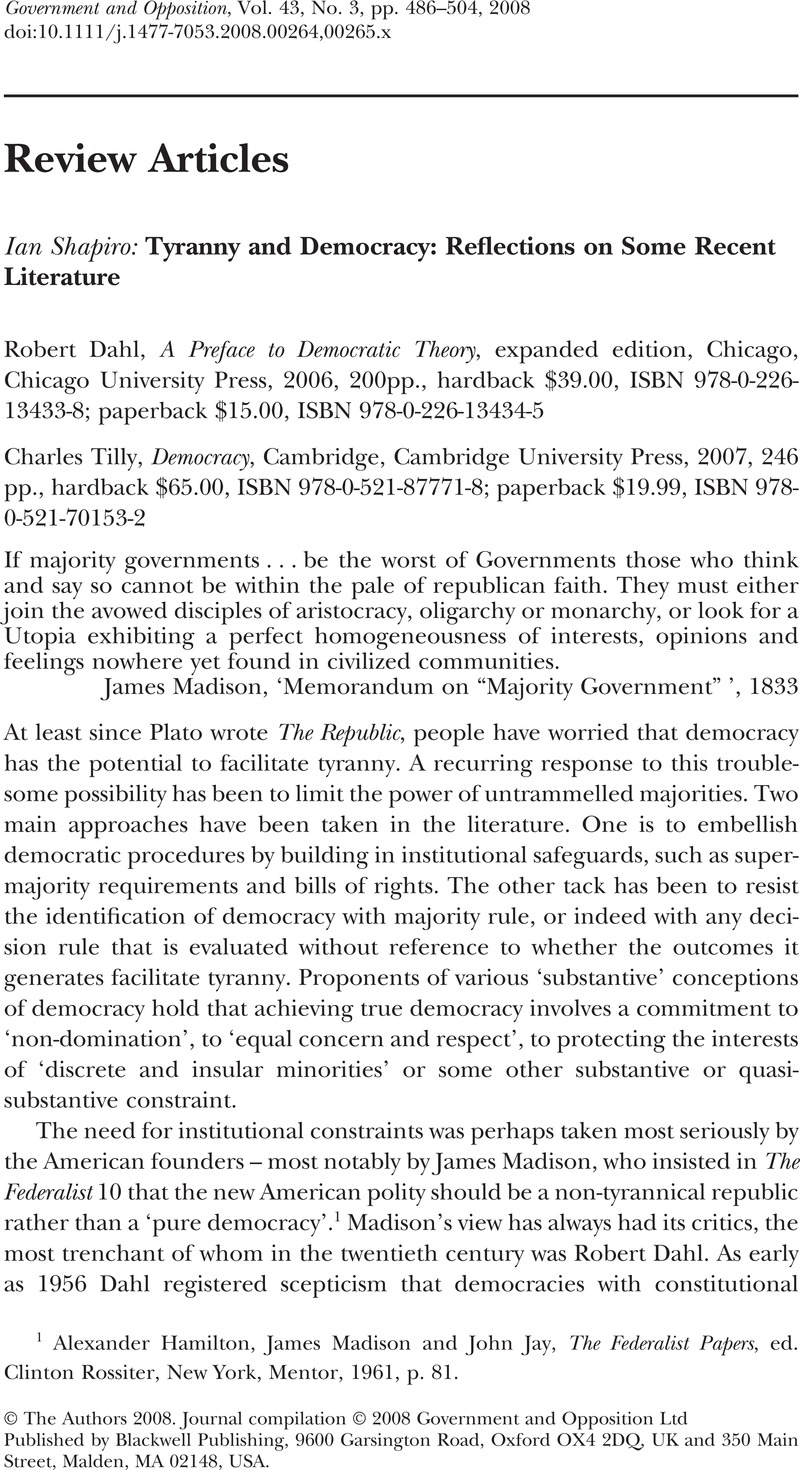No CrossRef data available.
Published online by Cambridge University Press: 28 March 2014

1 Alexander Hamilton, James Madison and John Jay, The Federalist Papers, ed. Clinton Rossiter, New York, Mentor, 1961, p. 81.Google Scholar
2 Robert Dahl, A Preface to Democratic Theory, Chicago, University of Chicago Press, 1956, pp. 105–12; and Dahl, Robert, ‘Decision-Making in a Democracy: The Supreme Court as National Policymaker’, Journal of Public Law, 6 (1957), pp. 279–95Google Scholar.
3 Robert Dahl, Democracy and its Critics, New Haven, CT, Yale University Press, 1989, pp. 188–92; Gerald Rosenberg, The Hollow Hope: Can Courts Bring About Social Change?, Chicago, University of Chicago Press, 1993; Ran Hirschl, Towards Juristocracy: The Origins and Consequences of the New Constitutionalism, Cambridge, MA, Harvard University Press, 1999; and Jeremy Waldron, Law and Disagreement, Oxford, Oxford University Press, 2001.Google Scholar
4 See Hirschl, Ran, ‘The Political Origins of Judicial Empowerment through Constitutionalization: Four Lessons from Four Constitutional Revolutions’, Law and Social Inquiry, 25 (2000), pp. 91–147 CrossRefGoogle Scholar.
5 Dahl, Preface, p. 143.Google Scholar
6 Tocqueville, Democracy in America, New York, Harper Collins 1969, pp. 50–8, 277–315; Robert Putnam, Making Democracy Work: Civic Traditions in Modern Italy, Princeton, Princeton University Press, 1993; and Robert Putnam, Bowling Alone: The Collapse and Revival of American Community, New York, Simon & Schuster, 2000. For criticism, see Levi, Margaret, ‘Social and Unsocial Capital: A Review Essay of Robert Putnam's Making Democracy Work ’, Politics and Society, 24: 1 (1996), pp. 45–6CrossRefGoogle Scholar.
7 Lipset, Seymour Martin, ‘Some Social Requisites of Democracy: Economic Development and Political Legitimacy’, American Political Science Review, 53: 1 (1959), pp. 61–105 CrossRefGoogle Scholar; Barrington Moore, The Social Origins of Dictatorship and Democracy: Lord and Peasant in the Makings of the Modern World, Boston, Beacon Press, 1966; AdamPrzeworski, Michael Alvarez, José Cheibub and Fernando Limongi, Democracy and Development: Political Institutions and Well-Being in the World, 1950–1990, Cambridge, Cambridge University Press, 2000.
8 Robert Dahl, ‘Reevaluating Madisonian Democracy’, afterword to the expanded edition of his A Preface to Democratic Theory, Chicago, University of Chicago Press, 2006, pp. 152–72.Google Scholar
9 Ibid., p. 166.Google Scholar
10 Ibid., pp. 160–7.Google Scholar
11 Kenneth Arrow, Social Choice and Individual Values, New York, Wiley, 1951.Google Scholar
12 Miller, Nicholas, ‘Pluralism and Social Choice’, American Political Science Review, 77 (1983), pp. 735–43CrossRefGoogle Scholar.
13 See Lijphart, Arend, ‘Consociational Democracy’, World Politics, 21 (1969), pp. 207–25CrossRefGoogle Scholar; and Arend Lijphart, Democracy in Plural Societies, New Haven, CT, Yale University Press, 1977. I leave to one side the great empirical difficulties associated with determining whether preferences in a population are mutually reinforcing or cross-cutting, and how, if at all, they can be transformed from the former to the latter. See my Democracy's Place, Ithaca, NY, Cornell University Press, 1996, pp. 177–80, 216–18.
14 For an argument that the importance of cycles has been exaggerated, see my The State of Democratic Theory, Princeton, Princeton University Press, 2003, pp. 10–16.Google Scholar
15 Dennis Mueller, Public Choice II, Cambridge, Cambridge University Press, 1989, pp. 63–6, 81–2.Google Scholar
16 Tangian, A. S., ‘Unlikelihood of Condorcet's Paradox in a Large Society’, Social Choice and Welfare, 17 (2000), pp. 337–65CrossRefGoogle Scholar.
17 Gerry Mackie, Democracy Defended, Cambridge, Cambridge University Press, 2000.Google Scholar
18 See John Witte, The Politics and Development of the Federal Income Tax, Madison, WI, University of Wisconsin Press, 1985.Google Scholar
19 Charles Tilly, Democracy, Cambridge, Cambridge University Press, 2007, p. 10.Google Scholar
20 Ibid.Google Scholar
21 Ibid., pp. 13–14, 23.Google Scholar
22 Ibid., p. 81.Google Scholar
23 Matthew Cleary and Susan Stokes, Democracy and the Culture of Skepticism: Political Trust in Argentina and Mexico, New York, Russell Sage, 2006.Google Scholar
24 Tilly, Democracy, p. 95.Google Scholar
25 Michael Walzer, Spheres of Justice: A Defense of Pluralism and Equality, New York, Basic Books, 1984.Google Scholar
26 Tilly, Democracy, p. 111.Google Scholar
27 Jeremy Seekings and Nicoli Nattrass, Class, Race, and Inequality in South Africa, New Haven, CT, Yale University Press, 2005.Google Scholar
28 Tilly, Democracy, p. 131.Google Scholar
29 Ibid., p. 137.Google Scholar
30 Daron Acemoglu and James Robinson, Economic Origins of Dictatorship and Democracy, Cambridge, Cambridge University Press, 2006.Google Scholar
31 Tilly, Democracy, p. 139.Google Scholar
32 David Held, Democracy and the Global Order, Stanford, Stanford University Press, 1995; and David Held, ‘The Transformation of Political Community: Rethinking Democracy in the Context of Globalization’, in Ian Shapiro and Casiano Hacker-Cordón, Democracy's Edges, Cambridge, Cambridge University Press, 1999, pp. 84–111.Google Scholar
33 Tilly, Democracy, p. 205.Google Scholar
34 Ibid., p. 195.Google Scholar
35 It might be said that Islamic fundamentalism has replaced communism as the main ideology that defines itself against, and as an alternative to, democratic capitalism, and that it could begin to command the allegiance of the dispossessed in the advanced countries. There is some truth to this, but Islamic fundamentalism differs from communism in that it lacks a political economy and is not, therefore, at bottom a competitor to capitalism. For further discussion see my Containment: Rebuilding a Strategy Against Global Terror, Princeton, Princeton University Press, 2007.Google Scholar
36 Ibid., p. xiv.Google Scholar
37 Sarah Song, Justice, Gender, and the Politics of Multiculturalism, Cambridge, Cambridge University Press, 2007.Google Scholar
38 Brian Barry, Culture and Equality: An Egalitarian Critique of Multiculturalism, Cambridge, MA, Harvard University Press, 2001.Google Scholar
39 Song, Justice, Gender, and the Politics of Multiculturalism, pp. 87–100.Google Scholar
40 David Kuo and John DiIulio, ‘The Faith to Outlast Politics’, New York Times, 29 January 2008, p. A25.Google Scholar
41 Douglas Rae, ‘Democratic Liberty and Tyrannies of Place’, in Ian Shapiro and Casiano Hacker-Cordón (eds), Democracy's Edges, Cambridge, Cambridge University Press, 1999, pp. 165–92.Google Scholar
42 Tilly, Democracy, pp. 164, 175.Google Scholar
43 Ibid., pp. 13–14.Google Scholar